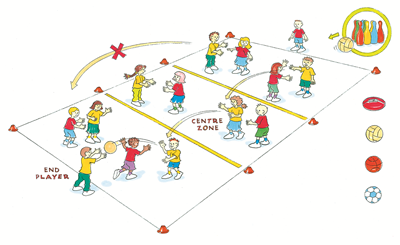 The Playing for Life activity cards adopt a game sense approach to teaching about games and sports. Game Sense is an approach to modified sport that:
The Playing for Life activity cards adopt a game sense approach to teaching about games and sports. Game Sense is an approach to modified sport that:
- engages children in minor and modified game strategies and concepts where there are opportunities to develop both skills and an understanding of the tactics of the game.
- encourages simple modifications (easier or harder) to accommodate varying ability levels and therefore maximises inclusion and challenge.
- modifies game rules, the playing area or the equipment for the purpose of highlighting aspects of the game such as attackers sending a ball beyond the reach of opponents or ‘forcing’ a striker to hit a ball with a bat into a defined region.
- promotes the development of ‘thinking players’.
Game Sense
- Fun
- Playing
- Decision making and problem solving
- Communicating and collaborating
- Inclusion and challenge
Teaching using the Game Sense approach
Game Sense uses a student-centred approach to teaching. Here you will find some tips on how to use a student-centred approach during your lessons.
Lesson plans
If the lesson is well constructed you won’t hear ‘When can we play the game?’ That’s because students will have a chance to get into the game related activities early and often. Playing for Life emphasises:
- games before drills and skills
- high-activity levels that are disguised within fun and challenging activities
- the CHANGE IT approach to modifying the activity for inclusion, challenge and skill development.
Correcting
- Use student role models, individuals and smaller groups to highlight either tactical aspects or technique.
- ‘Let the kids play’ before intervening with ‘coaching tips’.
- Once an activity is in play, take individuals or small groups who may need some specific guidance
- (discrete coaching) to one side.
- Observe, observe, observe… avoid over-coaching.
Questions/challenges
- Use questions often – the Playing for Life cards include many ‘Ask the player’ prompts.
- Remember questions/challenges can substitute for ‘telling’.
- Questions can also prompt students to come up with modifications to ‘include all’.
Feedback
- Keep to small doses and be specific. ‘Keep your arm straight’ is better than a negative statement.
- ‘That was good because’… is better than a ‘feel good’ statement like ‘great shot’.
- ‘Sandwich’ a correction in between some positive feedback.
Lesson management
Effective class management has a big impact on starting activities, forming groups, activity levels, safety, setting new tasks, including all and your ability to maintain an engaging lesson.
- Lesson plans guide the flow of your lesson.
- Continually review, modify and experiment.
- Rehearse in your mind things like:
- starting an activity
- transitions
- forming students into groups
- finish up.